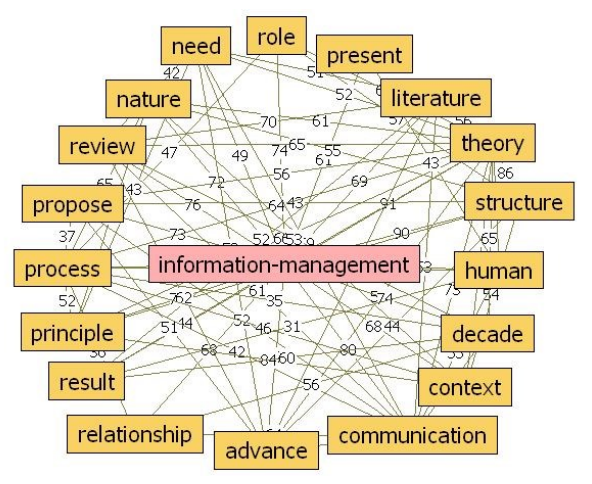Difference between revisions of "Template:Article of the week"
Shawndouglas (talk | contribs) (Updated article of the week text.) |
Shawndouglas (talk | contribs) (Updated article of the week text.) |
||
| Line 1: | Line 1: | ||
<div style="float: left; margin: 0.5em 0.9em 0.4em 0em;">[[File: | <div style="float: left; margin: 0.5em 0.9em 0.4em 0em;">[[File:Fig6 BuřitaJOfSysInteg2018 9-1.png|240px]]</div> | ||
'''"[[Journal: | '''"[[Journal:Information management in context of scientific disciplines|Information management in context of scientific disciplines]]"''' | ||
This paper aims to analyze publications with the theme of [[information management]] (IM), cited on Web of Science (WoS) or Scopus. The frequency of publishing about IM has approached linear growth, from a few articles in the period 1966–1970 to 100 at the WoS and 600 at Scopus in the period 2011–2015. From this selection of publications, this analysis looked at 21 of the most cited articles on WoS and 21 of the most cited articles on Scopus, published in 31 different journals, oriented to [[informatics]] and computer science; economics, business, and management; medicine and psychology; art and the humanities; and ergonomics. The diversity of interest in IM in various areas of science, technology, and practice was confirmed. The content of the selected articles was analyzed in its area of interest, in relation to IM, and whether the definition of IM was mentioned. One of the goals was to confirm the hypothesis that IM is included in many scientific disciplines, that the concept of IM is used loosely, and it is mostly mentioned as part of data or information processing. ('''[[Journal:Information management in context of scientific disciplines|Full article...]]''')<br /> | |||
<br /> | <br /> | ||
''Recently featured'': | ''Recently featured'': | ||
: ▪ [[Journal:A systematic framework for data management and integration in a continuous pharmaceutical manufacturing processing line|A systematic framework for data management and integration in a continuous pharmaceutical manufacturing processing line]] | |||
: ▪ [[Journal:Unmet needs for analyzing biological big data: A survey of 704 NSF principal investigators|Unmet needs for analyzing biological big data: A survey of 704 NSF principal investigators]] | : ▪ [[Journal:Unmet needs for analyzing biological big data: A survey of 704 NSF principal investigators|Unmet needs for analyzing biological big data: A survey of 704 NSF principal investigators]] | ||
: ▪ [[Journal:Big data as a driver for clinical decision support systems: A learning health systems perspective|Big data as a driver for clinical decision support systems: A learning health systems perspective]] | : ▪ [[Journal:Big data as a driver for clinical decision support systems: A learning health systems perspective|Big data as a driver for clinical decision support systems: A learning health systems perspective]] | ||
Revision as of 15:48, 10 July 2018
"Information management in context of scientific disciplines"
This paper aims to analyze publications with the theme of information management (IM), cited on Web of Science (WoS) or Scopus. The frequency of publishing about IM has approached linear growth, from a few articles in the period 1966–1970 to 100 at the WoS and 600 at Scopus in the period 2011–2015. From this selection of publications, this analysis looked at 21 of the most cited articles on WoS and 21 of the most cited articles on Scopus, published in 31 different journals, oriented to informatics and computer science; economics, business, and management; medicine and psychology; art and the humanities; and ergonomics. The diversity of interest in IM in various areas of science, technology, and practice was confirmed. The content of the selected articles was analyzed in its area of interest, in relation to IM, and whether the definition of IM was mentioned. One of the goals was to confirm the hypothesis that IM is included in many scientific disciplines, that the concept of IM is used loosely, and it is mostly mentioned as part of data or information processing. (Full article...)
Recently featured:
- ▪ A systematic framework for data management and integration in a continuous pharmaceutical manufacturing processing line
- ▪ Unmet needs for analyzing biological big data: A survey of 704 NSF principal investigators
- ▪ Big data as a driver for clinical decision support systems: A learning health systems perspective










